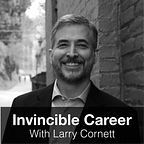Welcome to Invincible Career — a newsletter by Larry Cornett that helps ambitious professionals live better lives. If you find this article helpful or interesting, consider sharing it with a friend or two. If you’ve been reading and enjoying my newsletter for a while, consider a premium membership that gives you access to my private community, weekly office hours, and exclusive professional development prompts and challenges!
My guest for this episode is Chris A. Cornett MD, MPT. He’s an associate professor of orthopedics at the University of Nebraska Medical Center.
He also works as a spine surgeon in the affiliated hospital Nebraska Medicine. He’s the L. Thomas Hood, MD, Professor of Orthopaedic Surgery & Rehabilitation. He is vice-chair of clinical services in the department of orthopedics, medical director of outpatient physical/occupational therapy at Nebraska Medicine, and co-medical director of the comprehensive spine program at Nebraska Medicine.
Clinically, he takes care of spine patients in the region. In addition to his administrative duties, he teaches medical residents, fellows, and students. He also participates in and publishes spine research.
You can find Dr. Cornett and more about his work here:
We talk about:
Why he decided to pivot to surgery after getting a master’s degree in Physical Therapy.
His commitment to a 17-year educational and training journey after high school.
Ways to fund an advanced education in medicine (e.g., providing primary care in underserved areas).
Why he thinks autonomy is more valuable than money.
The future of medicine, healthcare, and surgery.
Key points from our conversation
I want to call out a few points from my conversation with Dr. Cornett to consider if you feel like you’re not working in a career you’re passionate about. If you’re a potential career changer, you’ll find this helpful.
Passion for your career
Don’t be afraid to pursue a career you will love. Some people will question your choice and belittle your commitment, but the only thing that matters is how you feel about it. For example, folks in our hometown made fun of me for pursuing a Ph.D. and teased Dr. Cornett about still being in medical school and training in his early 30s.
But, we only have one life. If you feel like you have a different calling, there’s something you can do that will fulfill you more, or there’s something more you can contribute to this world or society; life isn’t long enough to not do it.
No matter how long it seems (i.e., preparing for your career), it doesn’t seem as long as sitting and doing work that you don’t like for the rest of your life. Even though you’re working a lot, it doesn’t feel like it in a job you enjoy.
He loves his work as a spine surgeon, and it’s more rewarding than any other job he’s ever had. Feeling fulfilled, positively impacting people’s lives, and doing work you love is worth the upfront investment to make that happen.
The value of autonomy
Being a surgeon can be hard when you’re training. You’re working a lot of hours, doing a lot of calls, the work is mandatory and “forced” on you, and you don’t have any control over your schedule. You don’t have a lot of autonomy.
He still works a lot of hours as a staff surgeon. But, the big difference is that his autonomy increased significantly.
That is one of the things he desires most. He values autonomy over income, work hours, etc. The question is, what are you willing to give up to have it?
Typically, the more autonomy you have in your job, the more you have to work. His hours are variable, but he’s never totally “off.” But, he controls his schedule and the work he does.
Every career has tradeoffs
You could have a job with more certainty, less stress, and predictable hours. But, the rewards are lower than a more demanding career. That’s just the reality.
Many people who have careers with higher income, more autonomy, and better long-term freedom have made sacrifices and significant investments to make that happen.
A significant investment in their education and training, which delayed the start of their primary work by several years or even decades (e.g., “Wow, are you still going to school?!?!”).
A willingness to work long hours, deal with significant stress, and take considerable risks to invest in rapid professional growth early in your career.
Accepting unpredictability in your life — and blending your work and life — to ultimately have more freedom.
Unless you’re really lucky, choosing an easier life, a simple career path, and a predictable 9-5 job won’t give you significant wealth, freedom, or control in your life.
⬆️ Scroll to the top if you want to listen to our entire conversation, and hear more of Dr. Cornett’s story! 🎧
Do you have a friend or family member who is considering a career in healthcare? They might enjoy this article and podcast episode. Feel free to share it with them!
By the way, there is still a great way you can support my work without spending any money on a premium subscription:
📣 Recommending my newsletter on social media! 📣
It only takes a few seconds, and it helps grow my business so I can continue making time to write it.
I’ll even provide some copy and paste text to make it easy to share on Twitter, Reddit, LinkedIn, Facebook, etc. Thanks in advance!
I've really been enjoying the Invincible Career newsletter by Larry Cornett (@cornett). If you want to get ahead at work and be happier in your job, but you aren’t subscribed yet, you’re missing out.
https://newsletter.invinciblecareer.com
This week’s office hours topic
⭐ Create a Plan to Achieve Your Goals
Larry Cornett is a leadership coach and business advisor who hosts a private mastermind community for ambitious professionals with weekly challenges, office hours, and confidential support. If you’re interested in starting your own business or side hustle someday (or accelerating an existing one), check out his “Employee to Solopreneur” course (launching later this year).
Larry lives in Northern California near Lake Tahoe with his wife and children, and a gigantic Great Dane. He does his best to share advice to help others take complete control of their work and life. He’s also on Twitter @cornett.













